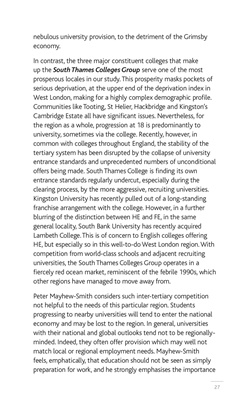
27
nebulous university provision, to the detriment of the Grimsby
economy.
In contrast, the three major constituent colleges that make
up the South Thames Colleges Group serve one of the most
prosperous locales in our study. This prosperity masks pockets of
serious deprivation, at the upper end of the deprivation index in
West London, making for a highly complex demographic profile.
Communities like Tooting, St Helier, Hackbridge and Kingston's
Cambridge Estate all have significant issues. Nevertheless, for
the region as a whole, progression at 18 is predominantly to
university, sometimes via the college. Recently, however, in
common with colleges throughout England, the stability of the
tertiary system has been disrupted by the collapse of university
entrance standards and unprecedented numbers of unconditional
offers being made. South Thames College is finding its own
entrance standards regularly undercut, especially during the
clearing process, by the more aggressive, recruiting universities.
Kingston University has recently pulled out of a long-standing
franchise arrangement with the college. However, in a further
blurring of the distinction between HE and FE, in the same
general locality, South Bank University has recently acquired
Lambeth College. This is of concern to English colleges offering
HE, but especially so in this well-to-do West London region. With
competition from world-class schools and adjacent recruiting
universities, the South Thames Colleges Group operates in a
fiercely red ocean market, reminiscent of the febrile 1990s, which
other regions have managed to move away from.
Peter Mayhew-Smith considers such inter-tertiary competition
not helpful to the needs of this particular region. Students
progressing to nearby universities will tend to enter the national
economy and may be lost to the region. In general, universities
with their national and global outlooks tend not to be regionallyminded.
Indeed, they often offer provision which may well not
match local or regional employment needs. Mayhew-Smith
feels, emphatically, that education should not be seen as simply
preparation for work, and he strongly emphasises the importance